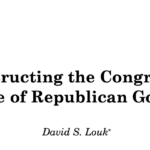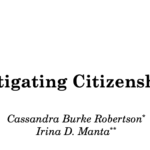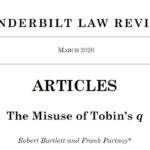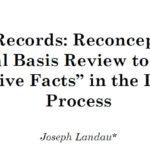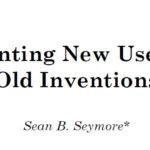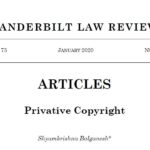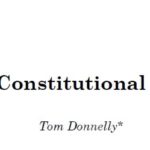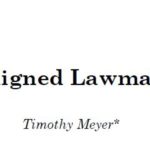Articles Category
Reconstructing the Congressional Guarantee of Republican Government
Apr. 20, 2020—David S. Louk | 73 Vand. L. Rev. 673 | The Republican Guarantee Clause of Article IV, Section 4 promises that “[t]he United States shall guarantee to every State in this Union a Republican Form of Government.” Although this clause might seem to confer significant power to oversee the political structures of the states, ambiguity...
Litigating Citizenship
Apr. 20, 2020—Cassandra Burke Robertson & Irina D. Manta | 73 Vand. L. Rev. 757 | By what standard of proof—and by what procedures—can the U.S. government challenge citizenship status? That question has taken on greater urgency in recent years. News reports discuss cases of individuals whose passports were suddenly denied, even after the government had previously...
The Misuse of Tobin’s q
Mar. 25, 2020—Robert Bartlett & Frank Partnoy | 73 Vand. L. Rev. 353 (2020) | In recent years, scholars have addressed the most important topics in corporate law based on a flawed assumption: that the ratio of the market value of a corporation’s securities to their book value is a valid measure of the value of the...
Broken Records: Reconceptualizing Rational Basis Review to Address “Alternative Facts” in the Legislative Process
Mar. 25, 2020—Joseph Landau | 73 Vand. L. Rev. 425 (2020) | In 2016, North Carolina passed “HB2,” also known as the “bathroom ban”—a law prohibiting transgender individuals from accessing public restrooms corresponding to their gender identity—based on the unfounded fear that cisgender men posing as transgender women would assault women and girls in bathrooms. Around the...
Patenting New Uses for Old Inventions
Mar. 25, 2020—Sean B. Seymore | 73 Vand. L. Rev. 478 (2020) | A bedrock principle of patent law is that old inventions cannot be patented. And a new use for an old invention does not render the old invention patentable. This is because patent law requires novelty—an invention must be new. But while a new use...
Privative Copyright
Jan. 21, 2020—Shyamkrishna Balganesh | 73 Vand. L. Rev. 1 (2020) | “Privative” copyright claims are infringement actions brought by authors for the unauthorized public dissemination of works that are private, unpublished, and revelatory of the author’s personal identity. Driven by considerations of authorial autonomy, dignity, and personality rather than monetary value, these claims are almost as...
Popular Constitutional Argument
Jan. 21, 2020—Tom Donnelly | 73 Vand. L. Rev. 73 (2020)| Critics have long attacked popular constitutionalists for offering few clues about how their theory might work in practice—especially inside the courts. These critics are right. Popular constitutionalism—as a matter of both theory and practice—remains a work in progress. In this Article, I take up the challenge...
Misaligned Lawmaking
Jan. 21, 2020—Timothy Meyer | 73 Vand. L. Rev. 151 (2020) | Since 1962, when Congress passed the Trade Expansion Act, every new U.S. trade deal has had the same essential bargain at its core. Congress agrees to give the president the power to lower trade barriers, while at the same time providing adjustment assistance for those...
Introduction: Professor Randall Thomas’s Depolarizing and Neutral Approach to Shareholder Rights
Nov. 25, 2019—James D. Cox & Frank Partnoy | 72 Vand. L. Rev. 1755 (2019) | Like Gaul, corporate law scholarship can be divided into three overflowing buckets: pro-manager, pro-shareholder, and empirical. We classify empirical scholarship as a separate category, in significant part because of Professor Randall Thomas. In the pre-Thomas era, much of the literature fell...
Mootness Fees
Nov. 25, 2019—Matthew D. Cain, Jill E. Fisch, Steven Davidoff Solomon, & Randall S. Thomas | 72 Vand. L. Rev. 1777 (2019) | In response to a sharp increase in litigation challenging mergers, the Delaware Chancery Court issued the 2016 Trulia decision, which substantively reduced the attractiveness of Delaware as a forum for these suits. In this...
Automating Securities Class Action Settlements
Nov. 25, 2019—Jessica Erickson | 72 Vand. L. Rev. 1817 (2019) | Securities class actions are supposed to vindicate the rights of investors injured by corporate fraud. Yet, despite multimillion- or even multibillion-dollar settlements, many injured investors never receive a dime in compensation. To receive money from a settlement in a securities class action, investors must comply...
The Case for Individual Audit Partner Accountability
Nov. 25, 2019—Colleen Honigsberg | 72 Vand. L. Rev. 1871 (2019) | Despite repeated regulatory interventions, accounting failures continue to persist in companies around the world. In this Article, I explain why regulatory oversight, private enforcement, and firm-level reputational sanctions are unlikely to induce accountants to take optimal levels of care when auditing corporate financials. Instead, our...
Lead Plaintiff Incentives in Aggregate Litigation
Nov. 25, 2019—Charles R. Korsmo & Minor Myers | 72 Vand. L. Rev. 1923 (2019) | The lead plaintiff role holds out considerable promise in promoting the deterrence and compensation goals of aggregate litigation. The prevailing approach to compensating lead plaintiffs, however, provides no real incentive for a lead plaintiff to bring claims on behalf of a...
After Corwin: Down the Controlling Shareholder Rabbit Hole
Nov. 25, 2019—Ann M. Lipton | 72 Vand. L. Rev. 1977 (2019) | As Delaware has developed its doctrine with respect to controlling shareholders, its view of their relationship to directors has evolved. This evolution has produced some pronounced inconsistencies with respect to the weight placed on director approval of controlling shareholder action. The recent Delaware Supreme...
Corporate Oversight and Disobedience
Nov. 25, 2019—Elizabeth Pollman | 72 Vand. L. Rev. 2013 (2019) | Over a decade has passed since landmark Delaware corporate law decisions on oversight responsibility, and only a small handful of cases have survived a motion to dismiss. Scholars have puzzled over what it means to have the potential for corporate accountability lodged within the duty...
Calculating SEC Whistleblower Awards: A Theoretical Approach
Nov. 25, 2019—Amanda Rose | 72 Vand. L. Rev. 2047 (2019) | The Dodd-Frank Act provides that Securities and Exchange Commission (“SEC”) whistleblower awards must equal not less than ten and not more than thirty percent of the monetary penalties collected in the action to which they relate; SEC Rule 21F-6 provides criteria that the SEC may...
